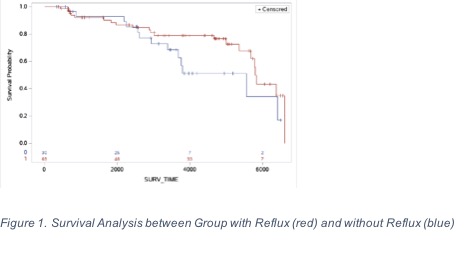Clinical Significance of Vesicoureteral Reflux in Children with Kidney Transplant
Michael G. Semanik, MD1, Ruthie Su, MD, MS2, Sharon Bartosh, MD1.
1University of Wisconsin, School of Medicine and Public Health, Department of Nephrology, Madison, WI, USA, 2University of Wisconsin, School of Medicine and Public Health, Department of Urology, Madison, WI, USA.
Background: The effect of posttransplant graft vesicoureteral reflux in children remains unclear. Herein we assess whether kidney graft reflux impacts graft survival.
Methods: After IRB approval was obtained, the health records of all patients who underwent kidney transplant between 2001-2018 were reviewed. Grade of reflux and graft survival were recorded. Graft survival time was defined as the interval between transplant surgery and date of graft failure requiring dialysis or death at the time of data collection. Survival analysis was done using proc lifetest in SAS v94. Continuous variables were compared using two-sided t-tests and proportions using chi-square test with significance determined at p<0.05.
Results: During the study period, 151 patients (<18 years) underwent renal transplants using the same surgical approach with extravesical ureteroneocystotomy. Of these patients, 99 (61 males, 38 females) had VCUGs at 6 months after surgery (Table 1). The average age at transplant was 10.6 years (range 1.5-17.8 years). End stage renal disease was secondary to congenital anomalies of the kidney and urinary tract in 40% (Table 2). All refluxing patients, irrespective of the reflux grade, were maintained on antibiotic prophylaxis. During the study period, 34 grafts failed, most commonly due to rejection and noncompliance. Twenty-one (62%) of the patients who had graft failure harbored VUR (p=0.21). Graft survival was similar between those who had VUR (average survival time, 12.3 years) and those who did not (average survival time, 14.2 years) (Figure 1, p=0.11).
Conclusion: Reflux to the transplant graft does not appear to impact graft survival. Routine VCUG post kidney transplant could guide clinicians with antibiotic coverage for patients with reflux.
Table 1.VUR Grade to Transplant Kidney
| Grade of Graft VUR | Total n=69 |
| 1 | 4 |
| 2 | 15 |
| 3 | 30 |
| 4 | 18 |
| 5 | 2 |
Table 2. Etiology End Stage Renal Disease
| Etiology of ESRD | Total n=99 |
| Glomerulonephritis | 14 |
| Congenital anomalies of the kidney and urinary tract (CAKUT) | 40 |
| Focal sclerosing glomerulonephritis | 8 |
| Hemolytic uremic syndrome | 5 |
| Nephronophthisis/cystinosis/polycystic kidney disease | 13 |
| Other | 19 |

Back to 2019 Abstracts




